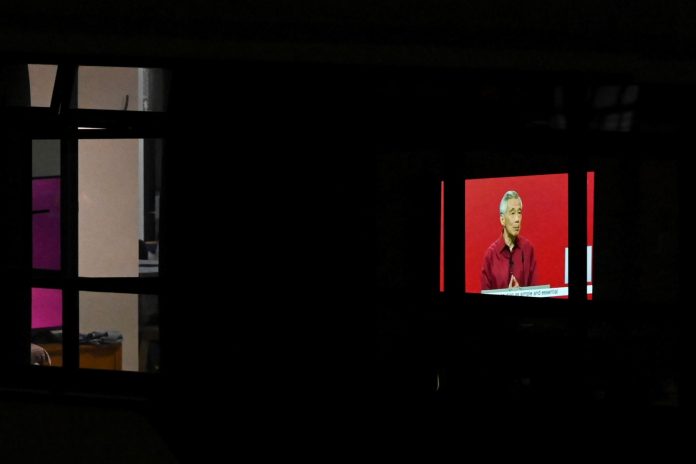Singapore’s Prime Minister Lee Hsien Loong announced Sunday the country will repeal a colonial-era law criminalizing gay sex, though he maintained that the government will continue to “uphold” marriage as being between a man and a woman.
Inherited from the British colonial era, section 377A of Singapore’s penal code penalizes sex between men with up to two years in jail.
Gay rights campaigners have long said the law runs afoul of the affluent city-state’s increasingly modern and vibrant culture, and had mounted two unsuccessful legal challenges.
During a major policy speech Sunday, Lee said attitudes have shifted since 15 years ago when the government decided the law should remain, although it has not been actively enforced.
Gay people “are now better accepted” locally, especially among younger Singaporeans, he said.
“It is timely to ask ourselves again the fundamental question: Should sex between men in private be a criminal offense?” Lee said.
“The government will repeal section 377A and decriminalize sex between men. I believe this is the right thing to do, and something that most Singaporeans will now accept.”
He added: “This will bring the law into line with current social mores, and I hope, provide some relief to gay Singaporeans.”
However, the repeal of section 377A stops short of full marriage equality.
Lee said the government recognizes that “most Singaporeans do not want the repeal to trigger a drastic shift in our societal norms across the board,” including how marriage is defined and how it is taught in schools.
“Hence, even as we repeal section 377A, we will uphold and safeguard the institution of marriage,” he said.
He stressed that under the law, “only marriages between one man and one woman are recognized in Singapore.”
The government will also amend Singapore’s constitution to keep this definition of marriage from being challenged constitutionally in the courts, Lee added.
‘Long road to equality’
The first attempt to overturn the law was rejected in 2014. The Court of Appeals dismissed the second challenge last February.
Ahead of Lee’s speech, an alliance of Protestant churches in Singapore had warned Friday against removing the law, which it described as a “marker for many social and moral considerations.”
Repealing the law without safeguards “facilitates the progress of a brand of intolerant and aggressive LGBT activism which seeks to impose its ideology upon Singapore society,” the alliance said.
Expressing “relief” over the government’s decision after Lee’s speech Sunday, gay rights campaigners called the repeal of section 377A the “first step on a long road towards full equality for LGBTQ+ people in Singapore.”
But “the true impact of repeal will be determined by how the people of Singapore respond to it, and treat each other, in the days and months to come”, they said in joint statement signed by more than 20 groups.
They also took aim at the government’s plans to enshrine the definition of marriage between a man and a woman into Singapore’s constitution — heeding calls from the city-state’s religious conservatives.
“Any move by the government to introduce further legislation or constitutional amendments that signal LGBTQ+ people as unequal citizens is disappointing,” they said.
“Such a decision will undermine the secular character of our Constitution, codify further discrimination into supreme law, and tie the hands of future Parliaments.”
In 2018, India’s Supreme Court decriminalized gay sex by overturning legislation from its own period under British rule — a decision that spurred campaigners in Singapore to renew their efforts to challenge the law.
The following year, Taiwan took the unprecedented decision in May to legalise same-sex marriage, becoming the first place in Asia to do so.









